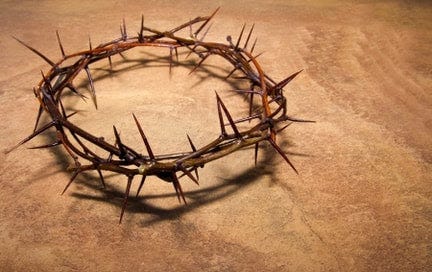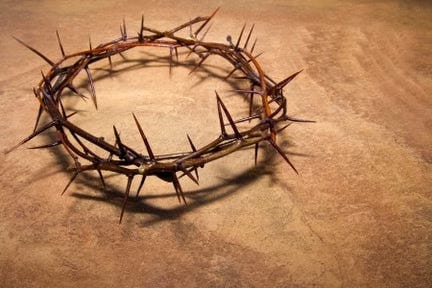Sunday Stretch: Vol. 103, Christ the King
Start off your week with a grounded take on Bible, prayer, the world, and your life ...
Hi Readers,
We are here again at Christ the King Sunday, the end of our long season of “Ordinary Time” (if only!) at least according to the rhythms of the Church Year. I do find following the traditional church year and lectionary/liturgical calendar somewhat comforting at this time of year, however, a gentle reminder of the lessons and memories of the past - and an encouragement not to rush forward too quickly into Christmas or even Thanksgiving. Instead, we are reminded to pause, and take each Sunday on its own merit.
However, due to the quirks of the modern calendar vs our church calendar, Christ the King Sunday often falls as the Sunday after Thanksgiving, or before Thanksgiving, as it does this year. And that often means that it’s a “low attendance” Sunday, or maybe a Sunday when the regular preacher is off (which is why my first “big” Sunday preaching as an intern pastor was Christ the King Sunday! A special memory from Las Vegas that I will never forget) …
That’s a shame, maybe, because Christ the King Sunday might just be the most important Sunday of the Church Year in an age of rising Christian Nationalism. Some may choose to eschew altogether the royal/monarchical symbols of this day, with its decadent hymns like “Crown him with many crowns.” I can see the reasons for doing that at a time when Christians are more known for embracing glory and the prosperity gospel and triumphalist politics, rather than mercy, kindness, and honoring widows and the poor.
Still, I think instead Christ the King offers us a critical reminder, a chance to say that if we cry out that Jesus is Lord, we must at the same time reject all earthly forms of royalty and political might. We must lift up the Way of nonviolence and compassion, and remember that our king rides in not on a chariot but on a lowly donkey (or maybe a colt?)
All that being said: happy Christ the King Sunday. May we find our worship today in the shadow of the theology of the cross, which reminds us that Jesus’ coronation was realized only in the wake of the crucifixion, as he wore a crown of thorns.
Let’s get to the texts!
Bible Stories
Daniel 7:9-10, 13-14
Dan. 7:9
As I watched,
thrones were set in place,
and an Ancient Onea took his throne,
his clothing was white as snow,
and the hair of his head like pure wool;
his throne was fiery flames,
and its wheels were burning fire.
10 A stream of fire issued
and flowed out from his presence.
A thousand thousands served him,
and ten thousand times ten thousand stood attending him.
The court sat in judgment,
and the books were opened.
In our final Sunday of the Church Year, we find ourselves again in the apocalyptic book of Daniel. I’m drawn here to the intense imagery of this passage, especially about the Ancient One’s hair being the texture of “pure wool,” and pure fire being issued from his mouth.
I also notice the mention of books in the final section of this passage. In the times when these biblical books were written down, books were rare and valuable items. How different from today, when few people bother to read books anymore, and we consider them almost throwaway items? What might it mean to value books again like this? (I know some of us still do!!)
Questions to Ponder
Why do you think the prophet Daniel mentions multiple thrones set in place? Would this be considered threatening to the current ruler of Babylon, who had conquered the Hebrew people in time of this writing?
Do some research about the prophet Daniel. What was happening in the world when the prophet was writing this book?
Why might the people of Daniel’s time have yearned for apocalypse?
Revelation 1:4-8
Rev. 1:4 John to the seven churches that are in Asia:
Grace to you and peace from him who is and who was and who is to come, and from the seven spirits who are before his throne, 5 and from Jesus Christ, the faithful witness, the firstborn of the dead, and the ruler of the kings of the earth.
To him who loves us and freeda us from our sins by his blood, 6 and madea us to be a kingdom, priests servingb his God and Father, to him be glory and dominion forever and ever. Amen.
7 Look! He is coming with the clouds;
every eye will see him,
even those who pierced him;
and on his account all the tribes of the earth will wail.
So it is to be. Amen.
Rev. 1:8 “I am the Alpha and the Omega,” says the Lord God, who is and who was and who is to come, the Almighty.
We continue our time in apocalyptic books by moving from Daniel to Revelation. I am struck that this final book of the Bible continues the letter form to churches that was begun by the Apostle Paul. I think it’s interesting to consider that most of the New Testament was written to particular people and communities. I find it instructive to me as a preacher, that I need to think specifically about who I am speaking to when I write (which is why I always think here on Substack about our own community, and the people who are reading these messages each week!)
Look up the seven churches of Asia that John refers to in this passage. Why is it significant that they’re called the 7 churches of Asia, specifically?
Why do you think these seven churches were referenced specifically by John?
I am struck by the description of Jesus as “the firstborn of the dead.” Why does John purposefully combine birth and death in his description of Jesus?
John 18:33-38
John 18:33 Then Pilate entered the headquartersa again, summoned Jesus, and asked him, “Are you the King of the Jews?” 34 Jesus answered, “Do you ask this on your own, or did others tell you about me?” 35 Pilate replied, “I am not a Jew, am I? Your own nation and the chief priests have handed you over to me. What have you done?” 36 Jesus answered, “My kingdom is not from this world. If my kingdom were from this world, my followers would be fighting to keep me from being handed over to the Jews. But as it is, my kingdom is not from here.” 37 Pilate asked him, “So you are a king?” Jesus answered, “You say that I am a king. For this I was born, and for this I came into the world, to testify to the truth. Everyone who belongs to the truth listens to my voice.” 38 Pilate asked him, “What is truth?”
Wow, here we go for Christ the King Sunday! This is the very passage that I use every time I speak now about Christian Nationalism and about the rise of authoritarianism globally and right here in the United States. This is such a rich passage,
Keep reading with a 7-day free trial
Subscribe to I'm Listening to keep reading this post and get 7 days of free access to the full post archives.




